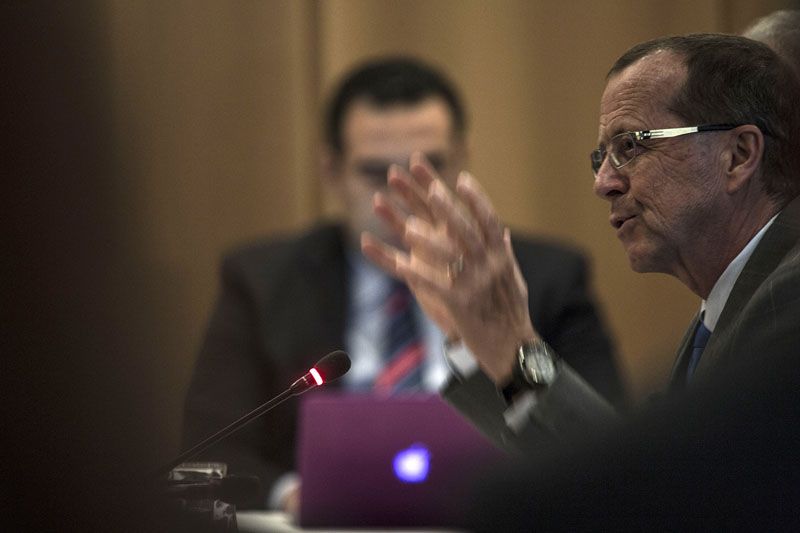By Libya Herald reporter.

Tunis, 10 December 2015:
There will be no more changes to the Libya Dialogue agreement UN Special Envoy Martin . . .[restrict]Kobler told delegates to a session convened by him in Tunis today. To do would be like opening Pandora’s Box. Instead, the agreement had to be rapidly put into effect – and would be, he insited. With the growth of the so-called Islamic State and the worsening humanitarian situation, the matter was urgent, he said.
“There must be a renewed legitimacy of the House of Representatives, and there must be a State Council in place,” he added.
Delegates were told much the same by the Tunisian Foreign Minister Taieb Baccouche: the UN-brokered Libya Political Agreement (LPA) needed to be signed as soon as possible because militants from the so-called Islamic State were expanding in Libya. That danger had to be the priority for Libyans, he said.
Speaking to the media after today’s session, Kobler insisted that he was much encouraged by what was his first Libya Dialogue session. There was consensus among the delegates that the agreement had to be signed quickly, he said.
There was agreement too, he added, that “nobody should go behind the back of any other participant of the political dialogue nor behind the back of the United Nations” – a clear condemnation of the rival “Tunis” deal agreed last Saturday in the same Ramada Hotel by groups from both the General National Congress (GNC) and the House of Representative (HoR).
At the meeting, designed partly in preparation for the Rome Conference on Libya on Sunday, were many of the political figures who had been involved in the wider Libya Dialogue process over the past year. As well as delegates from the House of Representatives such as Emhemed Shouaib and its rapporteur Saleh Hama there were members from the General National Congress including the leader of former GNC delegation to the Dialogue, Salah Makhzoum, as well as Nizar Kawan of the Justice and Construction Party (J&C) and Belgassem Gzeit, the Misrata member who leads the pro-LPA group within the GNC. Also present were political party leaders, including the J&C’s Mohamed Sawan, Guma El-Gamaty of the Taghyeer Party and Mohamed Ali Abdullah for the National Front.
Others present included former deputy prime minister Mustafa Abushagur who had flown in from the US, as well as Fathi Bashagha and Naima Gebril.
Absent, however, was the Watan Party’s leader, Abdulhakim Belhaj, as well the current members of the GNC delegation to the Libya Dialogue – Abdulrahman Sewehli, Awad Abdul Saddeq and Mohamed Bagi.
The latter two’s absence was unsurprising, They are now part of the rival “Tunis” deal, having been part of the five-member GNC delegation to it.
Despite Kobler’s optimism, the tone among the various delegates at the today’s gathering was rather more muted. There was little sense of enthusiasm or energy among them. Almost all refused to give any comments, saying they needed to hear the latest proposals from Kobler first.
There were some exceptions. One independent delegate who has been involved in the process from the start said that the names of the three remaining members of the presidency council (two deputy prime minsiter and a senior minister) would be chosen before the gathering ended on Friday. Another said the unity government headed by Faiez Serraj would be formally approved by the Dialogue before the end of the month.
(Kobler himself said that the date for the signing would be settled at the Rome meeting which will be chair by US Secretary of State John Kerry.)
Bucking the general mood, GNC member Gzeit who was attending for the first time said that he was “very optimistic” that the unity government would be approved. There were many in the GNC who, like him, backed it but they were afraid of publicly declaring their support he said. They were no longer, however, the majority. In any event, it would be impossible for there to be a vote in the GNC on the unity government and the LPA.
Appearing to confirm his view, a statement purportedly signed by 82 GNC members has now appeared supporting the Tunis deal and describing the UN-brokered one as unacceptable. [/restrict]





